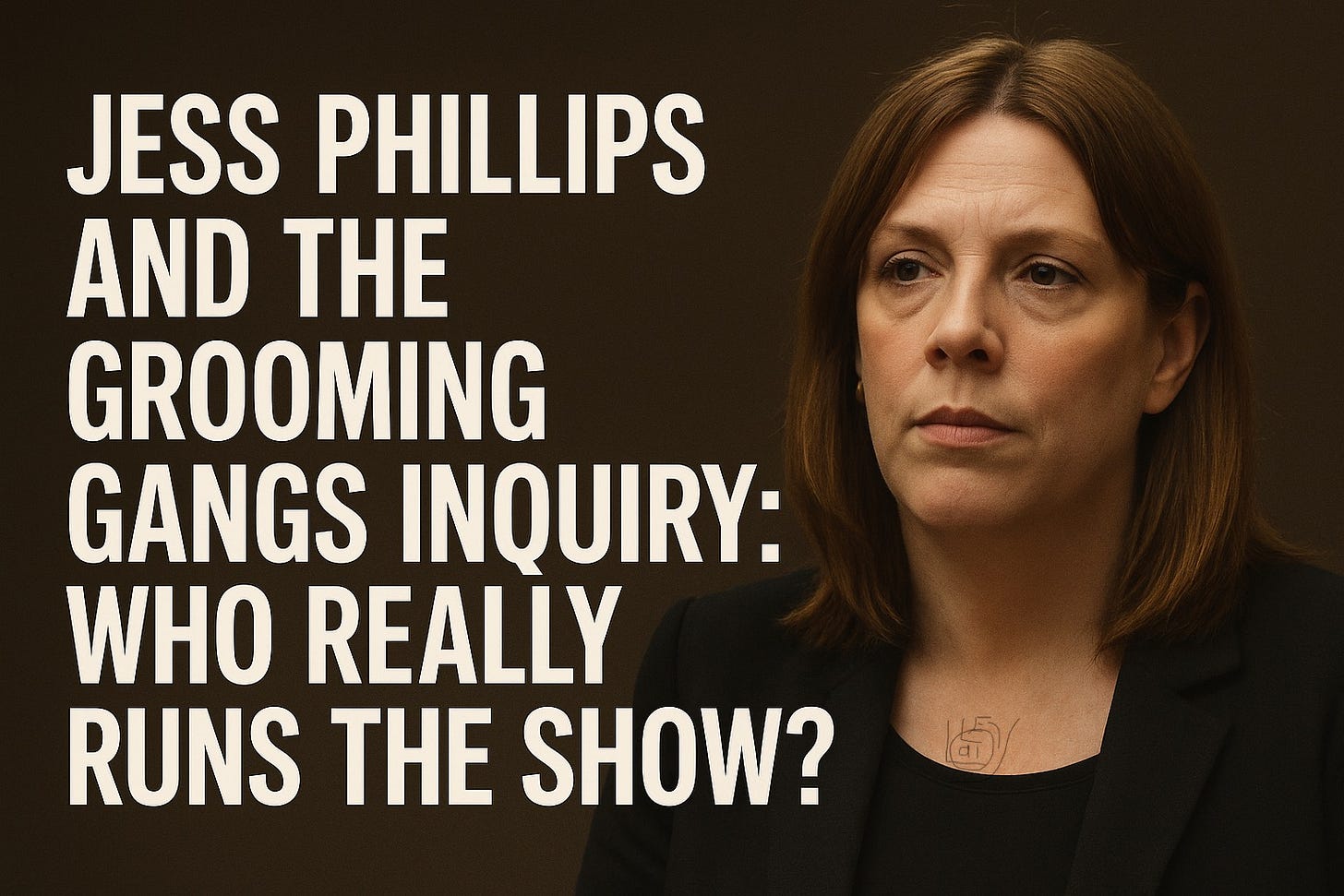Grooming Gangs Inquiry: Who is in Charge ?
Can an inquiry about institutional failure be credible when its supporting machinery is financially tied to the very institutions under examination?
Jess Phillips has never been one to duck a fight. Yet the row now surrounding her over the government’s new national inquiry into group based child sexual exploitation may prove the toughest of her career.
Four survivors from the inquiry’s victims panel have resigned and called for her to step down. They claim the process has been mishandled and that trust has collapsed. The government has responded by rallying behind her. Five other survivors have written to the Prime Minister and the Home Secretary saying they will only continue their involvement if Phillips remains in post.
The result is a stand-off. A safeguarding minister defending her position. Two groups of survivors in open disagreement. An inquiry that has not yet begun its formal work already under strain.
Chairs, confusion and credibility
Two prospective chairs have withdrawn before the inquiry has even started. Jim Gamble, a former police officer, cited interference and a hostile atmosphere. Annie Hudson followed soon after.
When two senior figures step back before the first hearing, confidence inevitably takes a hit. Ministers insist the inquiry will continue as originally planned under the framework set by the Louise Casey audit. Even so, the picture is one of an investigation into institutional failure struggling to establish its own footing.
At the heart of the disagreement lies the question of scope. Some survivors want the inquiry to remain focused on organised grooming gangs like those seen in Rotherham and Telford. Others say their own experiences do not fit that model and that the inquiry must cover a broader range of group offences.
The debate is understandable. Defining the boundaries of the inquiry will define who it represents and who it leaves out.
Who manages the survivors
Another question is proving just as sensitive. Who exactly manages the survivors’ panel and its engagement with government.
Reports indicate that the Home Office has contracted a Derby based charity called NWG Network to handle that work. If correct, it means that a charity rather than a statutory team is running the link between ministers and survivors. That arrangement deserves public understanding.
The charity in the middle
NWG describes itself as a national network of practitioners working to tackle child exploitation. It focuses on training, awareness programmes and professional coordination.
Its latest Charity Commission filings show income of around nine hundred and thirty thousand pounds with seventeen staff. About three quarters of its expenditure goes on salaries. The charity does not run refuges, helplines or casework teams. It delivers training and shares professional practice.
That is a legitimate purpose in itself. Yet if such a body is asked to manage survivors in a national inquiry, it is reasonable to ask whether its experience and structure match the role.
A dependence on public funding
Open grant data from GrantNav lists more than five million pounds of awards to NWG since 2010. The largest funders are Sport England, the Department for Digital Culture Media and Sport and the National Lottery Community Fund, with smaller grants from charitable foundations.
In other words, NWG operates almost entirely within a grant economy funded by government and lottery distributors. There is little evidence of income from trading or independent fundraising.
That reliance does not imply misconduct, but it does mean that the organisation’s survival depends on public money. When survivors express concern that the process feels managed from the centre, the funding pattern inevitably invites scrutiny.
Phillips’s political bind
Jess Phillips is now caught between two imperatives. She is a long-standing campaigner for women and girls, and her supporters say she has acted with fairness and consistency. Her critics see her as too close to Whitehall procedure and not close enough to survivor experience.
If she resigns, the inquiry risks losing direction. If she stays, it must work through a visible split among the people it is supposed to serve. Two chairs have already walked away and the structure around survivor engagement remains unclear.
Who sets the agenda
There are practical questions that need immediate answers. Who writes the agendas for survivor meetings. Who approves them. Who invites participants. Who records decisions.
The Home Office has not published this information and NWG has not clarified its role. Until those details are transparent, suspicion will fill the space.
The solution is simple governance. Publish the management chart. Release the contract. Set out the decision making chain. Make the minutes available in redacted form where necessary.
Only openness will restore trust.
Olley’s take
This story is about more than one minister. It is about how government handles conscience. Instead of building a transparent independent inquiry secretariat, the Home Office appears to have subcontracted part of that duty to a mid-sized charity whose income depends on government grants.
That may have been done in good faith, but it muddies the line between oversight and ownership.
Jess Phillips will keep fighting her corner, as she always has. Yet the bigger issue is structural. Can an inquiry about institutional failure be credible when its supporting machinery is financially tied to the very institutions under examination.
Until that question is answered, the public will keep asking who really runs the show.



